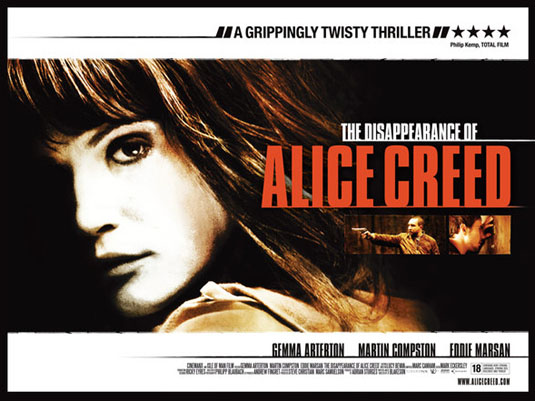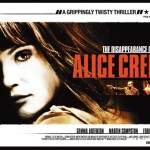The Disappearance of Alice Creed is a simple, low-budget claustrophobic 3-handed thriller, which benefits from the virtues of good film-making, solid script, fine casting and excellent acting. It also benefits from the most haunting closing title song (Holy Moly by Cathy Davey) I can recall since Little Light of Love by Eric Serra finished the messy Fifth Element with a real bang!
But I digress. This is a very simple tale of millionaire’s daughter, the eponymous Alice Creed played by the ever-stunning Gemma Arterton, kidnapped by two methodical ex-cons, Vic and Danny (the fashionable Eddie Marsan and Scottish actor Martin Compston), to extract a large ransom from Creed’s estranged father. The opening 10 minutes, the preparation for the abduction, involves almost no dialogue but is totally riveting. The plot includes a number of twists, but excludes complications from the actual ransom.
Two thirds of the story is locked within a tower block apartment about the interaction between three people, and in that human light it works very well – far better than if it had been plot-driven like most action pieces. The atmosphere, framed in simple, drab colours and tawdry sets, works chillingly.
Marsan has a pedigree of playing ruthless psychopathic gangsters, which he does to startling and credible effect, but playing a victim going through stages of humiliation and revenge was a step into the dark for Arterton, not least because of the nude scenes that demonstrate Creed’s vulnerability. She proves her range and acting credentials to good effect. The glue between the two is Compston’s character,
Danny, arguably the most difficult of the three roles because it requires emotions to be hidden yet communicated to the audience. Danny is by far the weakest of the three, easily dominated by Vic and manipulated by Alice, yet has the resilience to fight back and make his own pitch for the money. Compston does a workmanlike job, certainly not overawed by his two more feted co-stars.
There the spoilers must stop, since twists and turns are never so effective than if they are a surprise – and written here it would sound mundane in any case. We’re not talking Usual Suspects, Sixth Sense or Memento sort of twists, and it’s misleading of the marketing of TDoAC to suggest it is. But it is greatly to the credit of writer-director J(onathan) Blakeson that the pace never drops and the tension ratchets up to the ending climax. A successful debut and hopefully bigger projects to follow – but if so, I hope he never loses the ability to hit a raw nerve in the audience.







